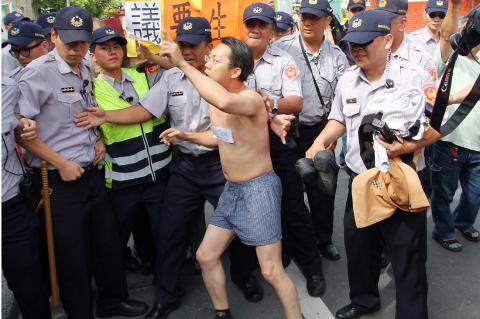|
SERVICES PACT:
Lawmakers lambast trade pact loophole
WEAK SPOTS: A loophole in the service trade pact
would allow a typical Chinese family — consisting of two parents and their
children — to migrate to Taiwan, lawmakers said
By Lin Shih-ping and Jake Chung / Staff reporter, with staff
writer

Police block Taiwan Solidarity
Union Tainan City branch director Chen Chang-hui as he removes his clothes and
protests in Tainan during a visit to the city by Premier Jiang Yi-huah
yesterday.
Photo: CNA
Opposition legislators criticized the
cross-strait service trade agreement yesterday, saying an existing loophole may
be exploited by Chinese investors and allow mass Chinese immigration to Taiwan.
Taiwan and China on June 21 signed the agreement, in which Taiwan will opened up
55 non-financial services to Chinese investment, including printing, tourism,
restaurants, packaging, delivery service, car rentals and the hair and beauty
industry.
Under to the agreement, Chinese investors may start a business within these
sectors or enter into joint ventures or partnerships with Taiwanese
businesspeople.
Chinese investors or workers will initially be allowed to stay in Taiwan for
three years, but are eligible to have their stay extended, with no restriction
on the number of renewals.
Opposition lawmakers lambasted the regulations for Chinese investment, saying
there is a loophole that will allow mass immigration by Chinese investors.
Vice Minister of Economic Affairs Woody Duh (杜紫軍) said the minimum investment
for Chinese investors is US$200,000.
For investments above US$300,000, an investor and two staff members may come to
Taiwan, Duh said, adding that for every additional capital injection of
US$500,000, another person may be added to the investor’s entourage, up to a
maximum of seven.
The opposition said a typical Chinese family, constrained by China’s “one child
policy,” can easily immigrate to Taiwan, as an investor can bring two staff,
which could be their spouse and a child.
Lawmakers said that President Ma Ying-jeou’s (馬英九) administration has been too
lax on restrictions, despite Minster of Economical Affairs Chang Chia-juh’s
(張家祝) defense of the policy.
Chang said that “running a business and immigration are different matters,”
adding that Chinese family members brought into Taiwan on a business visas would
not be eligible to receive a Taiwanese national identification card and would
therefore be unable to work.
Pointing to Germany as an example, lawmakers said that foreigners establishing a
company in Germany needed at least 1 million euros (US$1.3 million) in funding,
must be proficient in German and must agree to other regulations such as
guaranteeing a certain number of jobs in the company for local residents.
These rules are in place to discourage immigration through investment, the
lawmakers said.
The cross-strait service pact has very low investment entry levels for all the
trade services that are opened to Chinese investment, and offers no detailed
explanation on what kind of withdraw mechanisms are in place for Chinese
investors, they added.
There are few guarantees of local workers’ rights, nor is there any sort of
inspection committee overseeing Chinese companies operating in Taiwan, the
lawmaker said.
The lawmakers said small and medium-sized firms and disadvantaged industries
would be most affected by Chinese investment, adding that the Ma
administration’s claims that the agreement was signed “with Taiwan’s and its
people’s interests in mind” and the principles of “fairness, dignity and mutual
benefit” were complete lies.
|
![]()
![]()
![]()